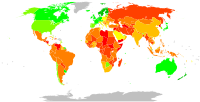
Photo from wikipedia
Purpose This study investigates the corruption practices from a behavioral perspective, and aims to verify the impact of health Management Information System (MIS) institutionalization on corruption vulnerabilities and the intention… Click to show full abstract
Purpose This study investigates the corruption practices from a behavioral perspective, and aims to verify the impact of health Management Information System (MIS) institutionalization on corruption vulnerabilities and the intention to commit corruption. The studied vulnerabilities are related to management: lack of internal control, accountability, transparency and disburdened administration. This study was conducted in the Brazilian public health system. Design/methodology/approach A research model and instrument were created based on the literature. The model was later tested using the partial least squares technique. A survey of 355 valid responses followed a pilot test with 87 ones. The respondents were civil servants of the Brazilian public health system. Findings Seven of the eight hypotheses were confirmed, supporting the main hypothesis that MIS institutionalization impacts individuals’ behavior by reducing their intention to commit corruption. Institutionalized health MIS improves public management, enabling the prevention of favoritism when awarding service provision contracts, undue payments to corrupt employees and waste of medical and hospital supplies. Originality/value This research adds to the knowledge on corruption from an individual’s behavior perspective influenced by MIS institutionalization in a Latin American perspective. Corruption is a social and cultural-based phenomenon, which reinforces the importance of understanding the effect of Information Systems institutionalization on corruption vulnerabilities in this context. A research model and instrument were created and validated, confirming corruption vulnerabilities that influence behavior. The intention to commit corruption is reduced when mediated by institutionalized MIS. Consequently, the focus must be shifted from moral beliefs to creating and strengthening organizational capacity to systematically identify and reduce vulnerabilities and deter misbehavior and wrongdoings.
Journal Title: Transforming Government: People, Process and Policy
Year Published: 2022
Link to full text (if available)
Share on Social Media: Sign Up to like & get
recommendations!